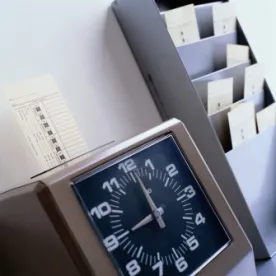The U.S. District Court for the Northern District of Illinois ruled in the City of Chicago’s favor on December 10, 2015, denying police officers’ claims that they were owed overtime pay for their off-duty use of work-issued BlackBerrys. In Allen v. Chicago, the officers had alleged that there was an unwritten policy not to pay them for that work, but failed to substantiate that allegation at trial. The case, filed as a collective action under the Fair Labor Standards Act (FLSA) more than five years ago, culminated in a bench trial that ended in August.
The plaintiff officers, all members of the City’s Bureau of Organized Crime (“BOC”), alleged that they frequently used their work issued BlackBerrys while off duty to communicate with superiors, staff, and informants. They claimed that they did not submit requests for payment for this work because there was a “pervasive culture or understanding within BOC that this work would not be compensated.”
In ruling that the plaintiffs failed to present adequate evidence of an unwritten policy to deny them compensation, the court noted that:
-
Several plaintiffs submitted payment requests and were compensated for off-duty Blackberry work;
-
At least two supervisors approved payment for off-duty work they knew was performed on BlackBerrys;
-
No plaintiff was ever told that he or she should not request payment for off-duty BlackBerry work;
-
Plaintiffs who submitted for payment for off-duty BlackBerry work were never reprimanded, disciplined, or removed from the BOC, even though some supervisors said they were aware these requests were being submitted and approved them.
The court likewise rejected the plaintiffs’ arguments that supervisors generally were aware that plaintiffs performed off-duty work on their BlackBerrys but made no effort to ensure they were compensated. Much of plaintiffs’ off-duty BlackBerry work occurred outside the physical presence of their supervisors, and supervisors were often unaware of whether a subordinate was on or off duty due to their highly fluid schedules. This rendered it impracticable to expect supervisors to know that officers were not being compensated for work time. That plaintiffs never raised any concern or complaint to any supervisor or union representative that they were not being paid for time they worked on their BlackBerrys while off duty also “prevented defendants from having actual knowledge of their off the clock work.”
Plaintiffs also argued that the City’s failure to specifically instruct officers to submit requests for payment for BlackBerry work implicitly suggested that such requests would be frowned upon. The court rejected this argument as well, noting that so long as the employer has a legal overtime payment policy, there is no legal requirement that the employer advise its employees to request payment each time overtime is worked.
In sum, while the plaintiffs showed that they performed off-duty work on their BlackBerrys, they did not demonstrate a knowing failure to pay for this work, including under any unlawful policy.
This case has been closely watched, as non-exempt employees’ use of electronic devices to perform remote work has come under increased scrutiny. The USDOL recently acknowledged the need to provide guidance to employers on the issue and is publishing a Request for Information (“RFI”) in February 2016 to gather information about employees’ use of such devices.
While awaiting direction from the USDOL, employers should consider conducting a privileged self-assessment of their remote device policies to determine the risk of overtime exposure.




 />i
/>i

